MAIN OFFICE
131 Racine Drive, Suite 202 Wilmington, NC 28403 (910) 790-4524 (910) 790-0392 Fax


Camilla M. Herlevich Executive Director ext. 206 camilla@coastallandtrust.org
John Napiecek Business Manager ext. 204 john@coastallandtrust.org
Terry Holt Office Administrator ext. 208 terry@coastallandtrust.org

Jesica C. Blake Director of Stewardship ext. 203 jesica@coastallandtrust.org
Christopher Ketchie Stewardship Biologist ext. 207 chris@coastallandtrust.org
Tatum Justice Stewardship Assistant ext. 201 tatum@coastallandtrust.org
Vann Pearsall Director of Development ext. 210 vann@coastallandtrust.org
Beth W. Steelman Development Associate/ Volunteer Coordinator ext. 200 bsteelman@coastallandtrust.org
Stephanie Borrett Development Assistant ext. 209 stephanie@coastallandtrust.org
CENTRAL OFFICE
Janice L. Allen Deputy Director 3301-G Trent Road New Bern, NC 28562 (252) 634-1927 (252) 633-4179 Fax janice@coastallandtrust.org
NORTHEAST OFFICE
Lee L. Leidy
Northeast Region Director Attorney at Law 205 N. Water Street, Suite 1 Elizabeth City, NC 27909 (252) 335-9495 lee@coastallandtrust.org

COASTLINES
Giving Bees and Butterflies a Hand

It is a tale as old as time — the story of the birds and the bees. Well, bees, anyway.
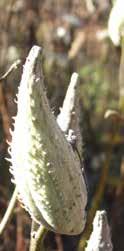
Since the beginning, humans have relied on a partnership with nature to survive. So it is only natural that when the tiniest workers in the human food chain are in danger, it is time to give them a little helping hand.
That’s exactly what the students at Dixon Elementary School in Holly
Ridge did this spring.
Onslow County’s Dixon Elementary helped create a new quarter-acre pollinator garden for bees and butterflies, on the Coastal Land Trust’s Everett Creek Preserve next to the school. The students planted 12 different species of plants favored by pollinators, including milkweed, asters, purple coneflower, blackeyed Susans, sunflowers and butterfly weed. In all, 24 students and parent volunteers worked with the Coastal Land Trust’s staff, and volunteers from Duke Progress, to plant over 600
pollinator plants.
Teacher Kristen McCutcheon is excited about the project. “This is more than a garden. This project has given select students in first through third grade a wonderful opportunity to solve real world sustainability issues,” she said.
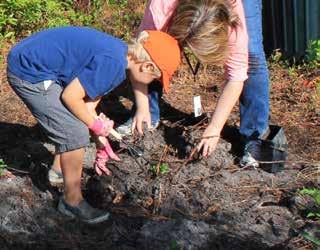
“This has been such a pleasure and huge learning experience for myself and the children here at Dixon Elementary,” McCutcheon said. “I am simply blown away by the shear amount of support by the countless volunteers that turned out
from many aspects of the community in order for the day to run as smoothly as it did.”
“Taking this piece of overgrown land and turning it into something beautiful is a learning experience that will become a lasting memory for these children. And hopefully even for some, be the start of a budding love and interest for the environment around them,” McCutcheon said.

Janice Allen, deputy director of the Coastal Land Trust agrees. “We are very pleased to work with our neighbor to create the
pollinator garden,” she said. “It is a great way to get kids involved with nature.”
The Coastal Land Trust owns a 250-acre tract along Everett Creek, across the road from the school. Much of the property is currently being restored to a longleaf pine forest. Now, the Coastal Land Trust has a pollinator garden as well. In the future, another larger 2-3 acres of the property will be turned into a pollinator meadow.
Allen hopes that the partnership will expand to include the school using continued on page 2
Piece by Piece
New Acquisition for Havelock Park
On the cusp of Earth Day, the Coastal Land Trust purchased a small piece of property in Craven County that highlights the many values we celebrate: conserving valuable forests for wildlife, connecting conservation lands, enhancing local water quality, and offering places for people to enjoy nature.
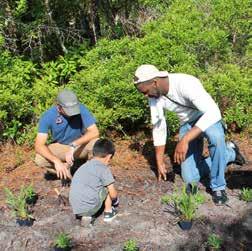
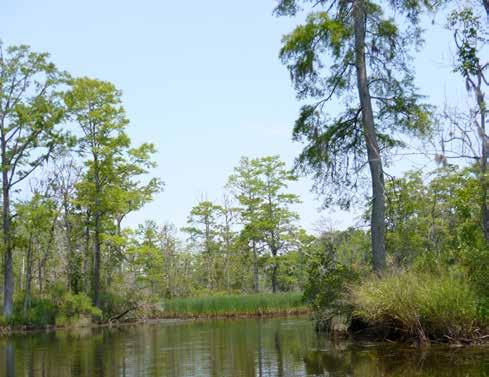
This property physically links a portion of the vast Croatan National Forest (known locally as the Paupers Island Tract) to over 350 acres of Coastal Land Trust conservation lands, specifically the Magnolia Farm Preserve and Lewis Farm Tract, along the Marine Corps Air Station Cherry Point’s western boundary.
Goodwin Creek, an unbelievably beautiful stream, winds through this area, eventually joining with Tucker Creek and on to the Neuse River Estuary. Ecologists with the North Carolina Natural Heritage Program
dubbed the richly diverse hardwood forests along Goodwin Creek on this property and the adjacent Croatan as a special natural area.
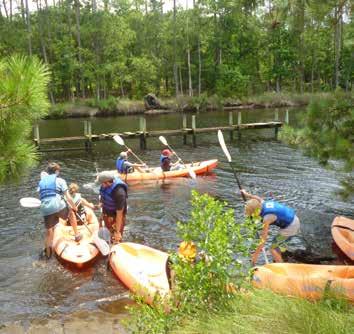
After purchasing the land from the Belangia family, the Coastal Land Trust gave it to the City of Havelock. The city added this to another property which the Coastal Land Trust gave them in 2013 to complement the city’s overall park vision. Along with canoe/ kayak access to the creek, the plan includes ball fields and nature trails.
Both the state and federal government hold easements over the property that restrict any residential and commercial development with the goal to protect the creek and the adjacent military base. This project represents a win for water quality, wildlife, recreational opportunities, and even our military.
The North Carolina Coastal Land Trust has expanded our Camp Sam Hatcher Preserve in Carteret County. This property lies along Gales Creek and was previously owned by the East Carolina Council of the Boy Scouts of America, with whom the Coastal Land Trust has partnered to protect these additional acres.
The Camp Sam Hatcher Preserve neighbors the Croatan National Forest. This provides a protective buffer to public lands and high quality natural heritage areas. This exceptional land also hosts longleaf pine sandhills and savanna habitat with rare plants and animals as residents. The property provides access to Gales Creek, a beautiful tidal creek that flows into Bogue Sound, an Outstanding Resource Water.
The Coastal Land Trust will continue to own, manage and steward this ecologically significant property that has been loved and enjoyed by so many through the years. The Coastal Land Trust is already utilizing this property for environmental education opportunities by partnering with local groups.
VOLUME 15 // ISSUE 2 SUMMER 2015
NORTH CAROLINA COASTAL LAND TRUST
www.CoastalLandTrust.org NC Coastal Land Trust Design By: Copycat Printshop Wilmington, NC STAY IN TOUCH
PAGE 1 www.CoastalLandTrust.org
Expanded Preserve Ideal Site For Environmental Education
PROTECTING POLLINATORS
Campers prepare to paddle Gales Creek at Camp Sam Hatcher
CAMP SAM HATCHER
LAND ACQUISITION
GOODWIN CREEK
Fool’s Day Burn
Lighting fire to the forest on April Fool’s Day sounds like a terrible prank, but Premier Forestry, a private forestry consulting company, wasn’t joking around when they lit the Coastal Land Trust’s Magnolia Farm Preserve in Craven County on fire on April 1st. In fact, they had a plan. The plan was to enhance a 30+acre pine forest for native wildlife by killing back some of the smaller hardwoods through a controlled burn. This would
allow more light to reach the forest floor and subsequently stimulating growth of native grasses and herbs.
The Coastal Land Trust has contracted with Seth Ward and his crew of Premier Forestry several times over the years to carry out prescribed burns at other preserves such as the B.W. Wells and Everett Creek Preserves. Anyone that has watched or worked on a prescribed burn knows it is not for sissies.


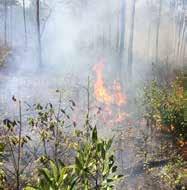
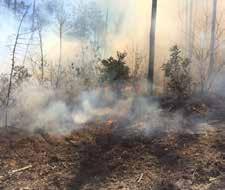
Not only does the crew have to make sure the fire does not jump the fire lines that are plowed before the burn, but they must also insure that the smoke does not affect sensitive areas like schools, hospitals, or people’s homes.
As usual, Premier Forestry did an excellent job on this Fool’s Day burn at the Magnolia Preserve picking the right

weather and wind conditions so that our neighbors in the Carolina Pines Subdivision weren’t smoked out. Seth Ward reported that the burn was a success and was hot enough to kill back some encroaching hardwoods and woody shrubs. Coastal Land Trust staff continues to monitor the preserve and watch the forest “green up” to provide food for many wildlife species.
Tree Farm Program and Sustainable Forest Initiative
It is official! The Coastal Land Trust recently received North Carolina Tree Farm certification for its Dupont Fayetteville Preserve in Bladen and Cumberland Counties. You may be wondering if the Coastal Land Trust going to be harvesting more trees?

Merrie Jo Joins New Bern Firm
Board member Merrie Jo Alcoke recently joined the law firm of Ward and Smith, PA in New Bern. Her law practice will focus on environmental matters with an emphasis on coastal development and regulation.
Merrie Jo previously served as an assistant attorney general with the North Carolina Department of Justice, practicing in the Environmental Division. She received her undergraduate and law degrees from the University of North Carolina. Merrie Jo is working part-time; she devotes her considerable energies not only to work, but to her family and community. She and her husband Tom Wilson, also an attorney, have two young daughters.

Rep. Davis Recognized as Conservation Leader
State Representative Ted Davis, Jr., was named Legislator of the Year for his passage of legislation to protect threatened Venus flytraps. He was among 11 conservation leaders recognized by the NC Land Trust at its annual meeting at the Kanuga Conference Center in Hendersonville in May.
Representative Davis was nominated by the North Carolina Coastal Land Trust.

Representative Davis has been a staunch advocate for protecting threatened Venus flytraps. Lands protected by NC State Parks, NC Wildlife Resources Commission, the US Forest Service, the Coastal Land Trust and The Nature Conservancy have all lost flytraps in recent years because of poaching.
GIVING BEES... CONTINUED FROM PG. 1
the Everett Creek property as an outdoor classroom. “The land will serve the extended community as a nature preserve, so it is only natural that it be used for elementary education,” she said.
Millie M. Chalk, District Manager for Duke Energy, led a crew of four enthusiastic Duke volunteers who assisted the children in planting the pollinator garden. “What a great opportunity to share the importance of protecting our environment with these young students”, she said. Duke Energy’s Foundation has provided a grant that is helping the Coastal Land Trust provide more environmental education at this preserve and others.
Recent statistics about the decline in pollinator species are daunting. Honeybee populations have been in steady decline for a decade, and just last year the number of Monarch butterflies migrating south was the lowest ever recorded. As a result, in 2014, President Obama issued a memorandum to all federal agencies to promote the health of honeybees and other pollinators across the country.
“For Monarch populations to rebound, it is vital that we act now,” said John Ann Shearer, Partners for Fish and Wildlife State Coordinator for the U.S. Fish and Wildlife Services. “So much of their habitat has been lost in our state due to development and regular mowing.”
The Fish and Wildlife Services works regularly with the Coastal Land Trust and is chipping in on the pollinator gardens. Duke Progress also contributed funds and volunteer assistance with the garden.
“We were already working with the Coastal Land Trust to restore longleaf pine on private lands,” said Shearer. “We were
able to add $33,000 to that cooperative agreement this past December to fund several projects to create pollinator gardens and in particular, to provide milkweed for Monarch butterflies.”
Pollinator gardens that include milkweed plants provide habitats for the Monarchs to reproduce. Other native pollinator plants provide essential food for the migrating butterflies. Shearer says, “Across the state, the gardens will provide essential habitats but also serve to support educational and outreach efforts associated with pollinator habitats.”
The Coastal Land Trust is administering a federal grant fund for the statewide effort and will distribute money to other groups as part of the mission. The North Carolina Botanical Garden will propagate native milkweed plants for planting across the state. The garden also owns undeveloped land in the Piedmont, where they will plant milkweed plugs.
No, this certification simply means any timbering that is done will be held to high standards. The Coastal Land Trust has always been a proponent of forest management with the goal to improve forests for wildlife.
The Tree Farm Program promotes forest stewardship and sustainable tree harvesting. This low-cost, non-contractual program provides members with tools such as seminars, field trips and access to professionals to do right by their land.
The Coastal Land Trust is just like many private forest land owners in North Carolina that desire to leave their wood, water and wildlife in healthy and plentiful supply for future generations.
Landowners need to carefully develop and implement a forest stewardship plan that addresses how their forests will be sustainably managed and how wildlife, water quality, soil resources and recreation will be enhanced. Many landowners need the assistance of a forestry consultant. The Tree Farm program will have the forest management plan reviewed through a third-party certification process and occasionally there may be scheduled visits from Tree Farm Program auditors to make sure best practices are being implemented.
The Coastal Land Trust decided to become involved in the Tree Farm Program back in early 2014. Tony Doster, representing the NC Local Implementation Team of the Sustainable Forestry Initiative (SFI), Inc. encouraged Coastal Land Trust staff to reach out to its conservation easement landowners about the importance of the Tree Farm Program.
departments. These groups will receive milkweed plants to place in existing fields, under power lines and along the edges of streams and rivers.
“Taking this piece of overgrown land and turning it into something beautiful is a learning experience that will become a lasting memory for these children. And hopefully even for some, be the start of a budding love and interest for the environment around them.”
Other partners include the N.C. Wildlife Resources Commission and Wake County and Raleigh parks and recreation
“Growing milkweed in old fields and meadows and even in small gardens can provide more habitat for Monarch butterflies,” explained Shearer. “Everything we can do to educate the public about the importance of preserving pollinator species will help to increase their numbers in North Carolina.”
Shearer is excited about this new team effort. “It amazes me how the Coastal Land Trust continues to find opportunities to encourage landowners to return the land to its natural condition for the benefit of native wildlife, and their willingness to support Monarch projects across the state is a fine example of their commitment to native habitats,” she said.
Staff researched the program, met with 14 conservation easement landowners, and were pleased to learn that some were already Tree Farm Program participants. Staff decided to put into practice what they were already preaching and started working with Jim Gray of JMG Forestry, Inc. to apply for Tree Farm Certification for the Dupont Fayetteville Preserve.
Being a Tree Farm member will require Coastal Land Trust to periodically update its Dupont Fayetteville Forest Management Plan, and to keep good records of all activities. Any timbering must be performed by timber harvesters known to carry out good timbering practices. It is a win-win to be a member of this network of forest landowners conserving our forest heritage.
If you are a landowner interested in the North Carolina Tree Farm Program, please go to www.treefarmsystem.org/ north-carolina.
NATURE TRIVIA - ANSWER
CThis small butterfly (.25 to .72 ounces) can travel from 50 to 100 miles a day and it may take a couple of months to get to their winter habitat in northern Mexico or southern California.
COASTLINES PAGE 2 www.CoastalLandTrust.org
LAND MANAGEMENT
COASTAL LAND TRUST IS A TREE FARMER
PEOPLE IN THE NEWS
EVENT SCRAPBOOK





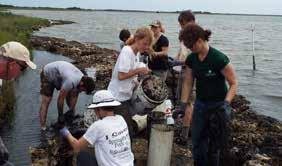

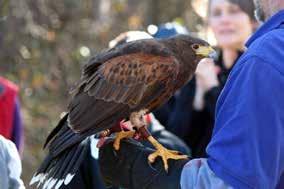

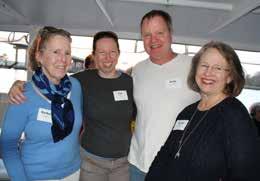

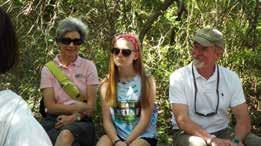

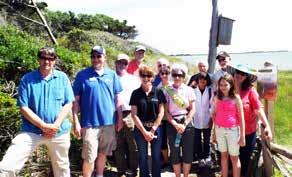
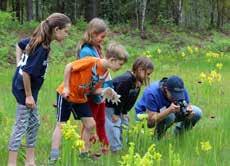

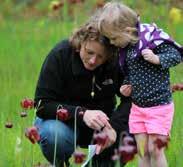
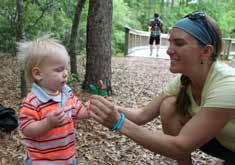
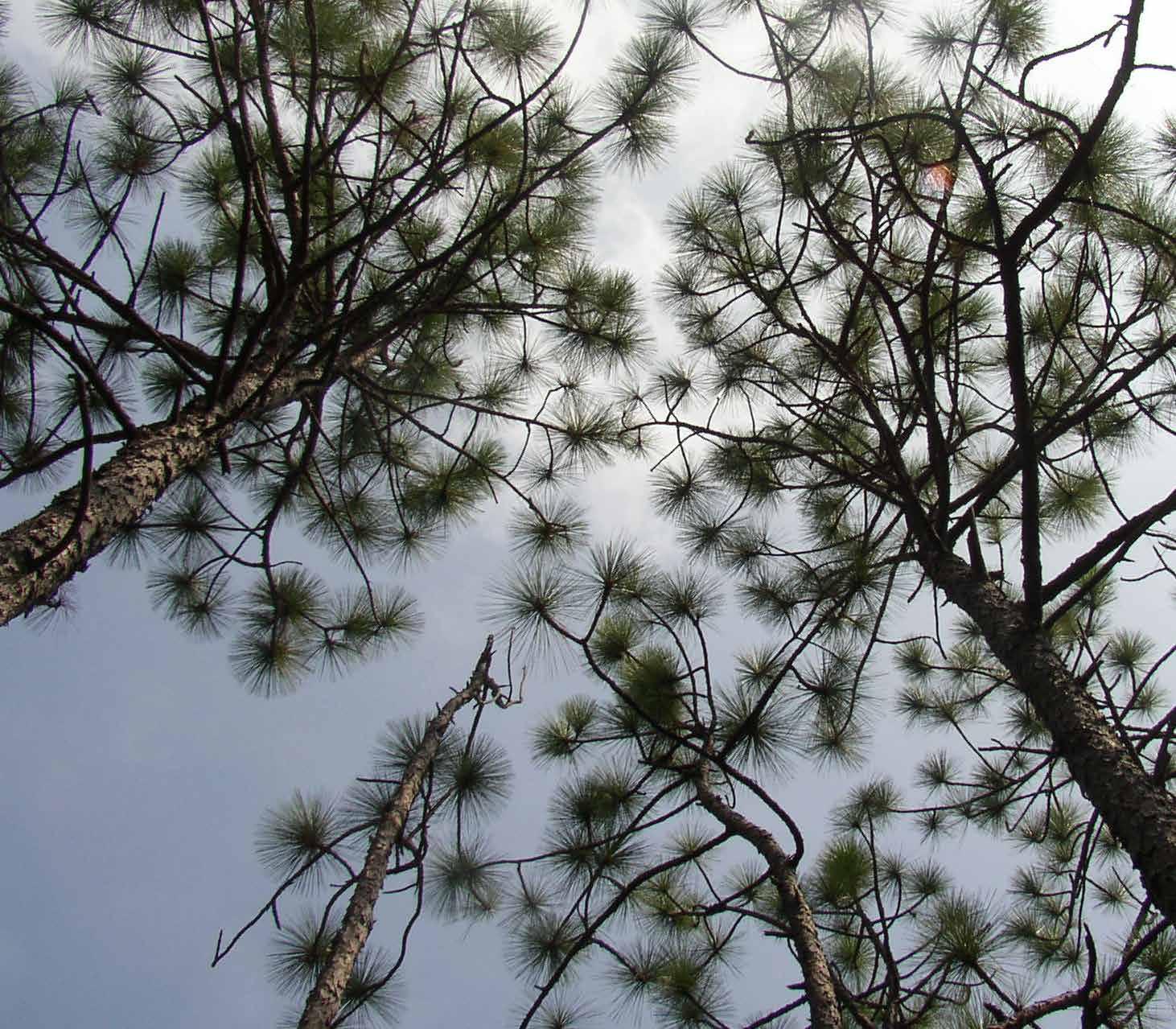
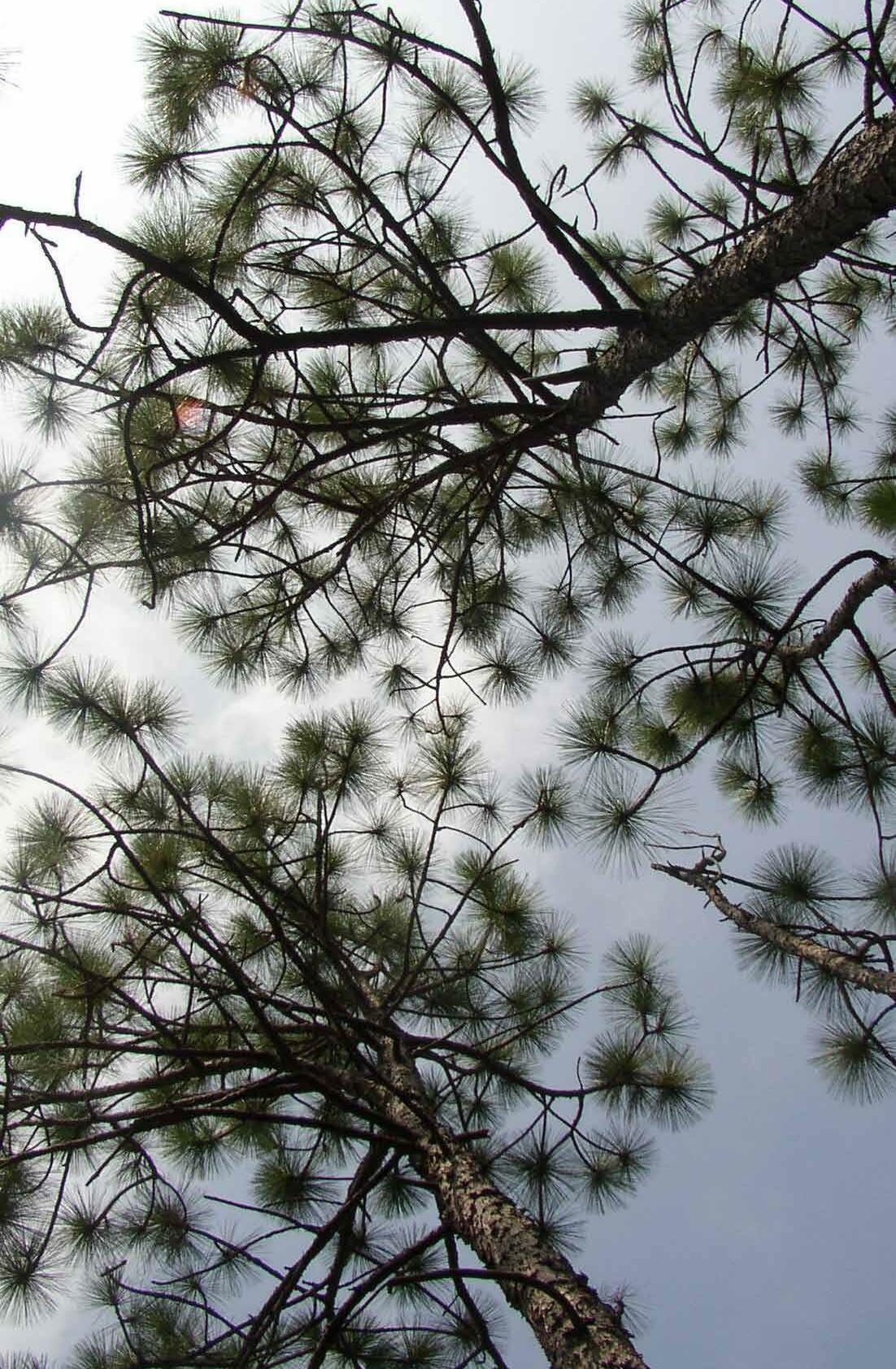
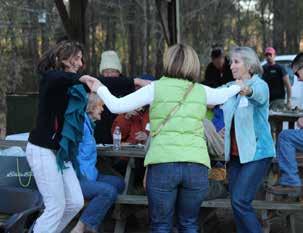
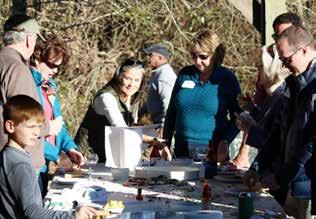
PAGE 3 www.CoastalLandTrust.org
Masonboro Sound’s got them jamming!
Friends and family gather for a delicious oyster roast.
Birds of prey attract an audience.
Field Trial Demonstration: Lab retrieves and “brings home” the float.
Diane and Bill Rhodes
From left: Barbara Sullivan, Tori Pace, Andy Crowther, and Rachel Pace
From left: Becky Huntzinger, Bob Swift and Carol Swift
Wine Not…It’s Friday! Was held the night before the Flytrap Frolic to benefit the Coastal Land Trust. Whole Foods Team Members with Ms. Flytrap are: Brandon Beaver, a rep with Tryon Distributing and Tracy Scott, one of Whole Foods’ local suppliers from Southport’s Tracy’s Gourmet Salad Dressing.
What a view! Guests enjoy the view from the deck of Ann Warner’s home on Ocracoke. The party, hosted by Ed and Susan Norvell and Ann, benefitted Springer’s Point Preserve.
Coastal Land Trust Major Donors cruised south on the Cape Fear River toward Clarendon Plantation. On the cruise were Clarendon owner Rachel Pace and her daughter…..who shared highlights from the history of Clarendon.
Volunteers and staff work to repair the oyster sill at Springer’s Point in the spring. The oyster sill, which is subject to continued erosion from storms, stabilizes the shoreline and restores the natural aquatic ecosystem.
New Friend. Julie Rehder has a new friend. Kids of all ages loved holding Sammi, a Bearded Dragon, native to Australia. Mark Todd, Acting President of the North American Sarracenia Conservancy, brought Sammi to the Frolic.
Picture Perfect. Kids are curious about the object of Stephanie Borrett’s camera: a small Venus flytrap found among a sea of pitcher plants.
Bottle Cap Flytrap. “This is how a flytrap captures its prey,” says Mom.
What’s got their attention? It’s specters! Philip Howard, whose greatgreat-great-great-great grandfather purchased Ocracoke Island in 1759, is spinning some ghostly tales during the field trip. From left Camilla Herlevich, Ella Pearsall, and Board President Ed Norvell.
The May Board meeting was combined with a field trip to Springer’s Point on Ocracoke Island. Shown here are Board members, staff and their guests.
Louis Cox tees off!
George Wright (Merchants Fixture Company), Hannah Holt and Mike Morketter (Pro Staffing Inc.)
Field Day at Five Eagle Partners Farm Flytrap Frolic Wine Not... It’s Friday Norvell Party for the Point Holt CStore Golf Tournament Wilmington | April 25, 2015 Whole Foods / Wilmington | April 24, 2015 Ocracoke | May 23, 2015 River Landing / Wallace | April 14, 2015 Be Our VaLANDtine! Oyster Sill Wilmington | March 24, 2015 Ocracoke | May 21, 2015 Board on the Move: May Board Meeting and Springer’s Point Tour Ocracoke | May 16, 2015 Rocky Point | March 7, 2015
From left: Sally Anger, Carolyn Leonard and Jane Raney







































COASTLINES Foundation and Corporate Sponsors • Air-Call Communications • Brunswick Electric Membership Corporation • Carol Sue Blueberry Farm • Carolina Health System • Coastal Beverage Company, Inc. • Cothran Harris Architecture • East Carolina Dermatology • ECS Carolinas LLP LUKENS ISLAND TIMBER ENTERPRISES, LLC ORTON LONGLEAF LLC SOUTHERN DIVERSIFIED TIMBER INGRAM AND COMPANY, INC. LOCALLY DISTRIBUTED BY R.A. JEFFREYS POINT CLAN, LLC The Murchison Group of Wells Fargo Advisors, LLC PAGE 4 www.CoastalLandTrust.org • First Citizens Bank • Frito Lay • Hanover Center • Harley and Associates Commercial Real Estate • HVW Legacy Holdings FLP • Land Management Group • Liberty Petroleum • McKim & Creed • MECO Florence • Mount Olive Pickle Company, Inc. • Rountree Losee LLP • S&D Coffee • Southern Insurance Agency, Inc. • Steele Electrical Contractors • Unifirst Save the Date 10.24.15 Winnabow, NC 9 a.m. - 1 p.m. 7 p.m. - 10 p.m. 4 p.m. - 7 p.m. Family Fun Day at Brunswick Nature Park 10.17.15 Gales Creek Preserve at Camp Sam Hatcher 10 a.m. - 12 noon “Show Me” Tour 10.10.15 Annual Celebration Lawn Party 10.29.15 Wilmington, NC Wilmington, NC Red Beans & Bluegrass BARTRAM SPONSORS LIVE OAK SPONSORS TIDEWATER SPONSORS COASTAL STEWARDS 12.24.15 - 1.02.16 NCCLT Closed for the Holidays
Crafting a Strategic Plan for the Future
This spring, the Coastal Land Trust sought ideas and advice in six “Conservation Conversations” throughout the eastern part of the state, distributed an electronic survey to more than 80 funders, stakeholders and partners, and gathered the Board of Directors and staff for a Retreat. Led by our able consultant Jeanie Duncan of Greensboro, the Board considered the wealth of information and ideas that were generated in response to some big questions: What is special about our coast? What challenges are facing the coast? What can the Coastal Land Trust do to help? Your Board of Directors learned a lot!
We learned that North Carolina’s coastal lands are unique and extraordinary, are greatly loved and are perceived as under great threats. We learned that the Coastal Land Trust is viewed by those who know it as an excellent and effective organization, with a crucial role to play in protecting the coast.
We also learned that the Coastal Land Trust isn’t well known or it isn’t as active in the community as it could be; and that it needs to greatly increase its capacity to meet current and future needs in operations, land acquisition and stewardship. (Yes, this means we’re going to have to raise more money for the coast!)
The Board of Directors is committed to taking the bold steps needed to propel the Coastal Land Trust to an even higher level of achievement. As President, I’ve been inspired by the ideas, passion and new innovations that have emerged during this spring’s strategic planning process. So stay tuned, as the staff and Board begin to implement ideas and strategies needed to “take it up a notch”. The coast is too important—for all of us—to give it less than our very best.
SUMMER INTERNS
Managing Staff Transitions
This spring, Jen Avesing, our Stewardship Biologist, told me that she and her husband Kyle would be moving to Kansas. Once again, I was reminded how the Coastal Land Trust has been enriched by the talents and skills of its amazing employees, and how fortunate we are to have had so little turnover in key positions. The average tenure for the current Coastal Land Trust staff is 12 years. Many of our staff are recognized experts in their fields, and are mentors to less experienced peers at other organizations.
The excellence of the Coastal Land Trust’s staff is the primary reason for its success in saving coastal lands. It’s my job, as Executive Director, to make sure that the staff has the training, support and resources they need. The Board of Directors recently affirmed that excellence is a core organizational value of the Coastal Land Trust.
As members and supporters of the Coastal Land Trust, you can be assured that we provide a workplace where employees thrive, collaborate, and grow. You can also be assured that we are prepared for staff transitions—planned or unplanned, temporary or permanent. At the staff level, each key employee has a written “Back-Up Plan,” which sets out the critical information needed in the event of their absence or departure. At the Board level, there is a Succession Policy, which details the process to be followed upon the departure of an Executive Director, Deputy Director, or other key staff. And just so you know, no other imminent departures are planned—at least, none that we know of!
I’m very grateful for my talented, hard-working, over-achieving colleagues here at the Coastal Land Trust. So Beth, Janice, Jesica, John, Lee, Stephanie, Tatum, Terry, and Vann, please take a bow! And Jen, thank you and good luck in Kansas!
James Porter - Law Intern
James is a rising second year law student at Campbell University’s Norman Adrian Wiggins School of Law. He received a bachelor of science degree in communications from North Carolina Agricultural & Technical State University in 2010.

His interest in land conservation derives from working outdoors as a teenager with Raleigh Parks and Recreation. During that time and from experiences gained from traveling abroad as a professional athlete, he was able to interact, volunteer, work with and observe various types of land use worldwide. Each individual experience allowed him to understand the importance of conserving and preserving working forests, as well as recreational, scenic, cultural, historical, and agricultural land.
As the legal affairs intern, James will provide the Coastal Land Trust with legal research and analysis on various legal issues including conservation easements. He will apply his background in communications to assist with planning Family Fun Day, creating press releases, and revamping social media and publicity efforts. He also hopes to assist the Coastal Land Trust in its efforts to enhance community involvement and awareness in land conservation.
SPRING INTERNS


Hunter PayeurLongleaf Pine Partnerships Stanback Intern
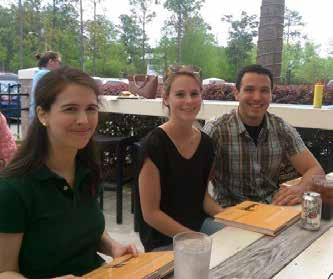

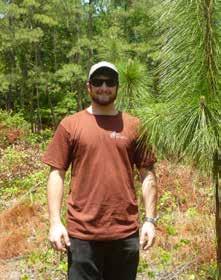
Hunterr is originally from Berlin, New Hampshire. He obtained his undergraduate degree in environmental science from the University of Richmond in Virginia. He is a current candidate for the master of forest resource management degree from the Nicholas School of the Environment at Duke University.
The responsibilities of this internship are to compile past and present longleaf management efforts as well as visit each Coastal Land Trust longleaf restoration site and offer management options for the future. The internship is focused on longleaf restoration efforts but Hunterr will participate in many of the Coastal Land Trust’s projects, which will give him first-hand experience working for a non-profit organization.
Taylor Barnett - Law Intern
Taylor is originally from Ohio where he earned an undergraduate degree in agricultural economics from The Ohio State University. Before law school, Taylor worked in the state senate and for Ohio Division of Wildlife. He currently attends Wake Forest University School of Law in Winston-Salem, North Carolina.
Among Taylor’s projects are to research the extent to which the conservation easements can be amended, help draft leases and facilitate closings on Coastal Land Trust property, and review Coastal Land Trust policies and procedures for reaccreditation with the Land Trust Alliance.
Bevacqua - Administrative Intern
Andrew Bevacqua interned with the Coastal Land Trust while a senior in the environmental sciences program at UNCW. Recently accepted to law school for the fall, he is well on his way to meeting his career goal to be an environmental attorney for a small firm or a nonprofit.
Andrew was a wonderfully well-rounded intern, who cheerfully helped out with special events, stewardship field work, strategic planning and administrative tasks.
Carmen Johnson - Stewardship Intern
Carmen is in the master’s program in environmental studies science at UNCW, and also has a bachelor’s degree in marine biology. This spring she assisted the stewardship staff to summarize land easements and created a brochure to promote the Coastal Land Trust’s new hiking trails at Camp Sam Hatcher. She enjoys kayaking and nature photography, which was a great bit of her work along Gales Creek at the Coastal Land Trust’s Camp Sam Hatcher Preserve.
Nicole Lyddane - Stewardship Intern
Nicole graduated from UNCW this spring with a major in environmental science and a minor in biology and geospatial technology. She moved to Wilmington in 2012 to start her degree, and has become passionate about local habitats. Her favorite part of interning at the Land Trust was traveling and monitoring conservation properties throughout the eastern coast of North Carolina.
By purchasing a specialty plate, you can fund our future by creating a new sustainable revenue stream that can greatly increase our ability to protect the beauty of the NC coast. For each plate on the road, the Land Trust
Visit www.CoastalLandTrust.org/licenseplate for more information on how you can get yours today!
 From Left to Right: Carmen Johnson, Nicole Lyddane, and Andrew Bevacqua
From Left to Right: James Porter, Hunterr Payeur, Taylor Barnett
The Coastal Land Trust preserves the forests, waterways, beaches and farms that make our coast such a great place to live, work, and play. Since 1992, we’ve protected more than 62,000 acres in the Coastal Plain of North Carolina.
receives $20 to fund coastal conservation – the other $10 supports tourism and highway beautification throughout the state.
From Left to Right: Carmen Johnson, Nicole Lyddane, and Andrew Bevacqua
From Left to Right: James Porter, Hunterr Payeur, Taylor Barnett
The Coastal Land Trust preserves the forests, waterways, beaches and farms that make our coast such a great place to live, work, and play. Since 1992, we’ve protected more than 62,000 acres in the Coastal Plain of North Carolina.
receives $20 to fund coastal conservation – the other $10 supports tourism and highway beautification throughout the state.
COASTLINES
Andrew
PAGE 5 www.CoastalLandTrust.org
Ed Norvell
MESSAGE FROM THE PRESIDENT
MESSAGE FROM THE DIRECTOR Camilla Herlevich






































































 From Left to Right: Carmen Johnson, Nicole Lyddane, and Andrew Bevacqua
From Left to Right: James Porter, Hunterr Payeur, Taylor Barnett
The Coastal Land Trust preserves the forests, waterways, beaches and farms that make our coast such a great place to live, work, and play. Since 1992, we’ve protected more than 62,000 acres in the Coastal Plain of North Carolina.
receives $20 to fund coastal conservation – the other $10 supports tourism and highway beautification throughout the state.
From Left to Right: Carmen Johnson, Nicole Lyddane, and Andrew Bevacqua
From Left to Right: James Porter, Hunterr Payeur, Taylor Barnett
The Coastal Land Trust preserves the forests, waterways, beaches and farms that make our coast such a great place to live, work, and play. Since 1992, we’ve protected more than 62,000 acres in the Coastal Plain of North Carolina.
receives $20 to fund coastal conservation – the other $10 supports tourism and highway beautification throughout the state.